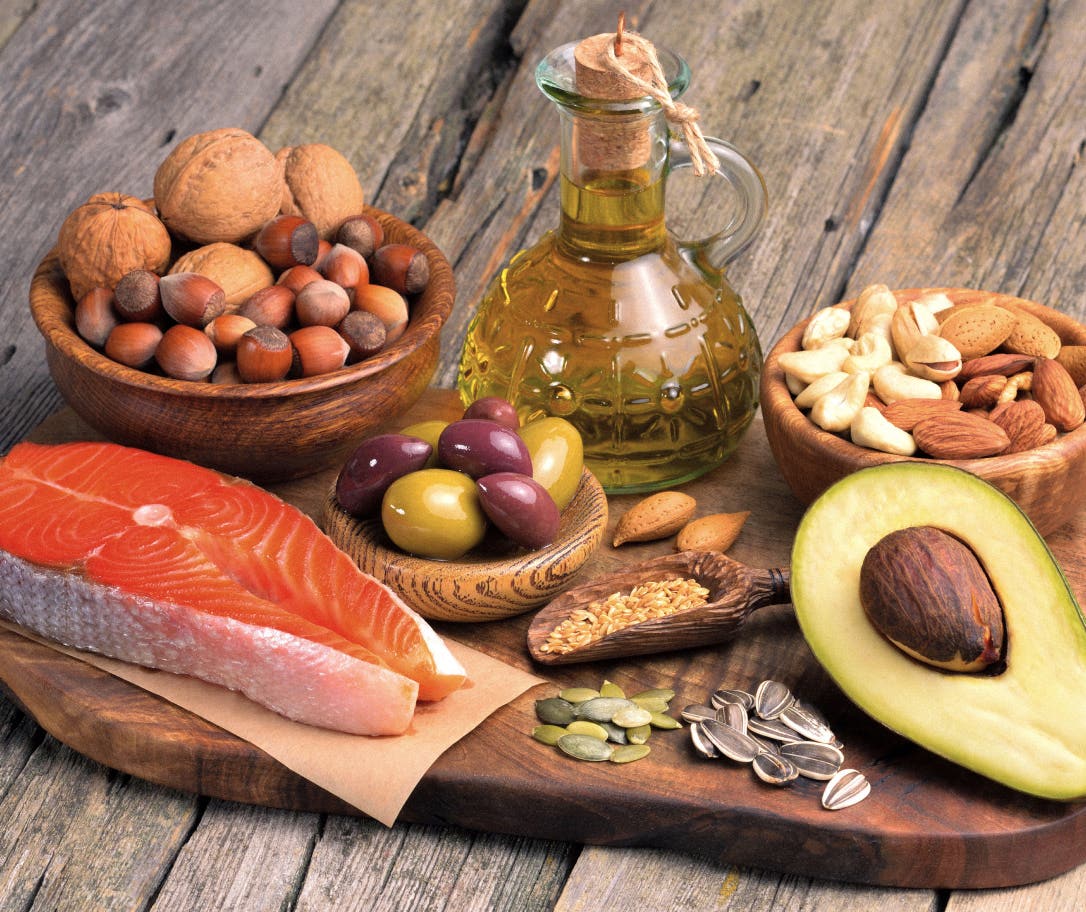Winter is coming… and that means chilly temperatures, long dark nights, and the temptation to eat something comforting (that’s maybe not necessarily in line with your healthy diet).
The change in season also means that our bodies need to work harder to maintain energy, support the immune system, and sustain performance.
That’s why it’s truly the most wonderful time of the year to prioritize eating healthy. Getting your diet on track will help keep illness and injury at bay. With a dose of exercise to further strengthen your immune defenses,1 you’ve got the perfect recipe to stay healthy this winter.
In this article, we’ll explore seven nutritional ways to support your body this winter so that you can feel and perform your best.
1. Prioritize immune-boosting nutrients
One of the best defenses you can have when flu season descends is to fill your plate with healthy whole foods. Opt for foods like fruits, vegetables, and whole grains.
These are great sources of antioxidants, like vitamins A, C, and E that support your immune system by reducing inflammation caused by oxidative stress, enabling you to fight off illness and infection.
And there are so many other foods that also offer immune-boosting nutrients. Check out our article on boosting your immunity for the full lowdown on foods you should prioritize.
If you’re motivated but need some inspiration on what to make – don’t worry, we’ve got you. Our favorite recipes to boost your immunity this winter provide some excellent ideas for meals that add an extra immunity-boosting punch to keep illnesses at bay. Plus, they’re mouth-wateringly good.

2. Eat warm, comforting foods
Winter is the perfect excuse to indulge in the benefits of cozy, warming foods. Hot foods are easier to digest because they are closer to the body’s core temperature, so they require less energy to break down. Bonus: some warm foods are also highly nutritious and taste delicious. Win-win!
The great thing about favoring warm foods at mealtimes is you can experiment with flavors and ingredients. Choose foods like soups, stews, and roasted vegetables to accompany good quality proteins and intensify the flavors with warming spices like ginger, turmeric, and cinnamon.
These taste great, add a bit of fire, and have anti-inflammatory and digestive benefits.
3. Incorporate probiotic foods to boost gut health
Probiotics are good bacteria that can provide overall health benefits if eaten in high enough quantities. Growing research shows that probiotics are important for energy, gut, and immune health.4
Incorporating probiotics into your diet is simple. Many foods naturally contain them, such as:
- Natural, live yogurt
- Kefir
- Kombucha
- Sauerkraut
- Kimchi
Probiotics can help maintain gut balance, fight off infection, aid nutrient absorption, and support recovery – all musts for all athletes. Multistrain probiotic supplements also deliver probiotic bacteria directly to your gut.

4. Stay hydrated even in cold weather
Athletes tend to drink less water in winter, but dehydration is still possible, even in colder temperatures. Every time you sweat or go to the bathroom, your body loses water, so staying on top of your hydration is more important than ever. Water is also fundamental to maintaining performance and fighting off illnesses.
But you don’t need to be guzzling H2O. Staying hydrated can also include eating soups and stews, contributing significantly to your total fluid intake. Plus, they are cozy, keep you warm, and boost your vitamins and minerals.
Other ways to avoid dehydration beyond basic water include:
- Drinking flavored water and herbal teas
- Eating water-rich foods (cucumber, melon, oranges)
- Avoiding lots of caffeine and alcohol, which can make you pee more
5. Avoid too much alcohol and caffeine
Alcohol and caffeine have a diuretic effect on the body, making you pee more, which increases the risk of dehydration. Plus, alcohol can have a detrimental effect on your performance by impacting your endurance, reactions, nutrient absorption, muscle health, and recovery.5
Although caffeine can have some positive effects for athletes,6 overconsumption can also lead to energy crashes, heart palpitations, and poor sleep.7
Try reducing your alcohol intake, especially at winter gatherings, by opting for some wintery mocktails or festive teas. When it comes to your daily cup of coffee, rotate in a decaffeinated, mushroom, or chicory root variety.

6. Get enough healthy fats
Fat is a good energy source and can help keep you warm during winter training and sports—however, the type of fat matters.
We’re not talking about the ultra-processed kind, like saturated fats. But instead, the healthy, unsaturated kinds, like extra virgin olive oil. Healthy fats can support your heart, brain, and gut health as well as acting like anti-inflammatories and regulating blood sugar levels.
Focus on monounsaturated fats and omega-3 fatty acids like those found in salmon, mackerel, walnuts, chia seeds, flaxseeds, and avocado.
7. Consider a vitamin D supplement
With winter comes shorter days, longer nights, and ultimately much less sun exposure which can lead to vitamin D deficiency. Low levels of vitamin D can cause muscle weakness, musculoskeletal pain, and fatigue, all of which can directly impact your performance.8
If you live in a region that has limited winter sunlight, like Northern Europe, you should consider taking a daily vitamin D supplement. Often, a supplement that contains 10 micrograms (mcg) of vitamin D9 is enough to support your general and immune health.
There are also limited sources of vitamin D-containing foods available, including eggs, mushrooms, and fortified breads and cereals.
Let’s recap
Nutrition is a key pillar in every athlete's training program, but even more so in winter. When your immune system, energy levels, and mental focus are on the line, it’s important to build a strong line of defense. And these seven tips can help you do just that.
Focus on nailing that well-balanced diet with immune-boosting foods, hydrating right, and soaking up that vitamin D as often as you can. By dominating the winter months, you’ll see your spring athletic performance blossom.
Sources
[1] Simpson, R. J., Campbell, J. P., Gleeson, M., Krüger, K., Nieman, D. C., Pyne, D. B., Turner, J. E., & Walsh, N. P. (2020). Can exercise affect immune function to increase susceptibility to infection?. Exercise immunology review, 26, 8–22.
[2] NHS, (2020). Vitamin A. Available at: https://www.nhs.uk/conditions/vitamins-and-minerals/vitamin-a/
[3] NHS, (2020). Vitamin C. Available at: https://www.nhs.uk/conditions/vitamins-and-minerals/vitamin-c/
[4] Mazziotta, C., Tognon, M., Martini, F., Torreggiani, E. and Rotondo, J.C., 2023. Probiotics mechanism of action on immune cells and beneficial effects on human health. Cells, 12(1), p.184.
[5] HSE. (2022). How alcohol affects sports performance. Available at: https://www2.hse.ie/living-well/alcohol/health/physical-health/sports-performance/
[6] Guest, N. S., VanDusseldorp, T. A., Nelson, M. T., Grgic, J., Schoenfeld, B. J., Jenkins, N. D. M., Arent, S. M., Antonio, J., Stout, J. R., Trexler, E. T., Smith-Ryan, A. E., Goldstein, E. R., Kalman, D. S., & Campbell, B. I. (2021). International society of sports nutrition position stand: caffeine and exercise performance. Journal of the International Society of Sports Nutrition, 18(1), 1. https://doi.org/10.1186/s12970-020-00383-4
[7] de Souza, J. G., Del Coso, J., Fonseca, F. S., Silva, B. V. C., de Souza, D. B., da Silva Gianoni, R. L., Filip-Stachnik, A., Serrão, J. C., & Claudino, J. G. (2022). Risk or benefit? Side effects of caffeine supplementation in sport: a systematic review. European journal of nutrition, 61(8), 3823–3834. https://doi.org/10.1007/s00394-022-02874-3
[8] Ip, T. S., Fu, S. C., Ong, M. T., & Yung, P. S. (2022). Vitamin D deficiency in athletes: Laboratory, clinical and field integration. Asia-Pacific journal of sports medicine, arthroscopy, rehabilitation and technology, 29, 22–29. https://doi.org/10.1016/j.asmart.2022.06.001
[9] NHS. (2020). Vitamin D. Available at: https://www.nhs.uk/conditions/vitamins-and-minerals/vitamin-d/